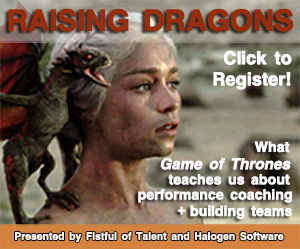WEBINAR: What does Game of Thrones have to do with performance coaching?
So what does the popular TV series Game of Thrones have to do with performance coaching and building great teams at work?
I have no idea, really.
I must admit to have never seen even a minute of Game of Thrones. But it seems popular with you kids, and even more popular with your pals over at Fistful of Talent - so much so that they have latched on to the idea of tying the show into some lessons for the workplace in the next installment of the FOT free webinar series.
Here are the details:
“Winter is Coming.” “You Win or You Die.” “You Know Nothing, Jon Snow.”
If you’re a Game of Thrones fan, you know these quotes as parts of iconic conversations from your favorite series. If you’re not a fan of the series (TV or book), you still likely recognize these quotes as fodder from a series that’s made a friend a bit too obsessive.
The team at Fistful of Talent? We view these quotes as coaching conversations. That’s why we’ve built our next webinar around Game of Thrones.
Join us on May 19th at 2pm Eastern for “RAISING DRAGONS: What Game of Thrones Teaches Us About Performance Coaching and Building Teams, and we’ll use Castle Black and King’s Landing to explore best practices in performance coaching by giving you the following goodies:
1. A quick rundown of the history of Game of Thrones from a leadership perspective. Have a favorite character who’s dead? Whether it’s Ned Stark or Khal Drago, we’ll go rapid fire and tell you what they did well from a coaching perspective, then tell you what dysfunction caused them to be… well… cancelled.
2. We’ll feature the 5 most notorious leaders currently alive on the show and break down their coaching style—where they’re strong and where they struggle—with the help of the performance management experts at Halogen Software. Odds are you’ll find a mother of dragons, a short fellow and dire wolf owner in this breakdown.
3. We’ll breakdown the five most common coaching conversations in corporate America today and tell you which Game of Thrones leader your managers should emulate to nail the conversation—so they can maximize their team member’s performance.
4. We’ll wrap up the webinar by telling you what the coaching styles of the 5 characters featured means for their future—and the future of the teams they lead.
You’ve signed up for enough boring webinars, right? Break the pattern and register for our Game of Thrones, webinar, and we’ll deliver the performance management/coaching science with a layer of pop culture you’ve grown to expect from Fistful of Talent.

 Steve
Steve


